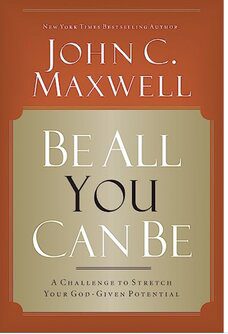In Be All You Can Be: A Challenge to Stretch Your God-Given Potential. Author John C. Maxwell shares strategies for stretching our God-given potential. The book contains lots of biblical references as a tool for teaching leadership principles.
Four Steps in applying success principles: Know, Show, Go and Grow.
You have to know the principles first of all, and then you have to show them. We’re to model these principles in front of others, since people have to see them. That’s more important even than hearing the principles. The going is the experience. You have to roll up your sleeves, get out into the field, and experience them.
Leaders vs Followers
Leaders stretch with challenges. Followers struggle with challenges. Losers shrink from challenges.
Success is nothing more than a few simple disciplines, practiced every day; while failure is simply a few errors in judgment, repeated every day.
Success is not an accident; it’s not luck or fate. It is predetermined. Success is worthwhile. Nothing is successful that does not contribute in a positive way to help people. Success is continual. It’s not an event but ajourney, an ongoing process. It’s not an accolade that we receive for a race won or a job well done. Success is the positive result of steady forward movement.
The average person’s lifetime includes twenty years of sleeping, six years of watching television, five years of dressing and shaving, three years of waiting for others, one year on the telephone, and four months of tying shoes.
Success is due to our stretching to the challenges of life. Failure comes when we shrink from them. There’s no such comes into the world fully equipped for success.
Criticism Phases
Jonas Salk, who developed the polio vaccine, was at- tacked continually for his creative, inventive work in the medical field. He found that criticism came in three stages. The first stage is when people tell you that you’re wrong—it won’t work. After they’ve seen you get some success under your belt, they say that what you’re doing isn’t really that important. Finally, after they see that it’s important, they’ll say that they knew you would do it all along.
Always Be Stretching
Too many people stop learning because they have come to believe that you go through twelve years of school and then you go to college for four years and then your education is over. But a good education really does nothing more than prepare you to stretch and learn for the rest of your life. Then there are people who stop trying because of bad past experiences. They say, “I tried that once before,” or, “I’ve already done that.” They allow one failure to put a lid on their abilities.
When you stop stretching, you become boring. Nothing bores me like people who haven’t had a new thought in the last year.
Mundane Men
People who see only what is immediate. They only reach out for things they can tangibly put their hands on. They go for convenience. They never look beyond themselves, and they never look at what they could be. A mundane man may be a truck driver, a bank president, or a schoolteacher. Mundane men can be found in every profession. A mundane man is really someone who lacks depth be- cause he lacks vision. The poorest person in the world is not the person who doesn’t have a nickel. The poorest person in the world is the one who doesn’t have a vision. If you don’t have a dream—a goal and a purpose in life—you’re never going to become what you could become.
Never too late
Think of the great men and women who continued to pursue their dreams into old age. Think of people life Moses, who at eighty years of age led 3.5 million people out of captivity. Or Caleb, who at eighty-five years of age said, “Give me that mountain.” Or Colonel Sanders, who at seventy years of age discovered “finger lickin’ good” chicken. Or Ray Kroc, who after age seventy introduced a Big Mac to the world. Then there’s Casey Stengel, who at seventy-five became the manager of the Yankees baseball team. And there’s Picasso, still painting at eighty-eight, and George Washington Carver, who at eighty-one became head of the Agriculture Department. There’s Thomas Edison, who at eighty-five invented the mimeograph machine, and John Wesley, who was still travelling on horseback and preaching at age eighty-eight.
Dedication
David Livingstone charted great paths for missions in Africa. One time, a missionary society wrote him a letter saying, “We have some people who would like to join you. Do you have some easy access roads to get where you are?” Dr. Livingstone wrote back and said, “If you have men who will come only if there are good roads, I don’t want them. I want men who will come even if there is no road at all.”
101 Percent Principle
If there is someone under your umbrella of leadership who tends to be obstinate, find the 1 percent on which the two of you agree, and give it all you’ve got—100 percent of your effort and ability. Let that 1 percent shred of agreement be the tie that binds you together.
“In matters of principle, stand like a rock. In matters of taste, swim with the current.” – Thomas Jefferson
Timing is everything
Timing is more important than time in a relationship. Walking into the lives of people when they really need you is more important than being with them all the times when they don’t really need you. Timing is essential.
YOUR DECISION DETERMINES YOUR DESTINY
- The wrong decision at the wrong time = disaster.
- The wrong decision at the right time = a mistake.
- The right decision at the wrong time = unaccceptance.
- The right decision at the right time = success
Until I am committed, there is a hesitancy, a chance to draw back. But the moment I definitely commit myself, then God moves also, and a whole stream of events erupt. All manner of unforeseen incidents, meetings, persons, and material assistance which I could never have dreamed would come my way begin to flow toward me—the moment I make a commitment.
All the best in your quest to get better. Don’t Settle: Live with Passion.



Comments are closed.